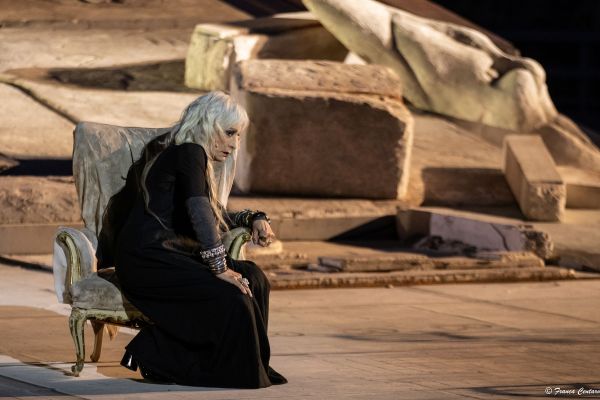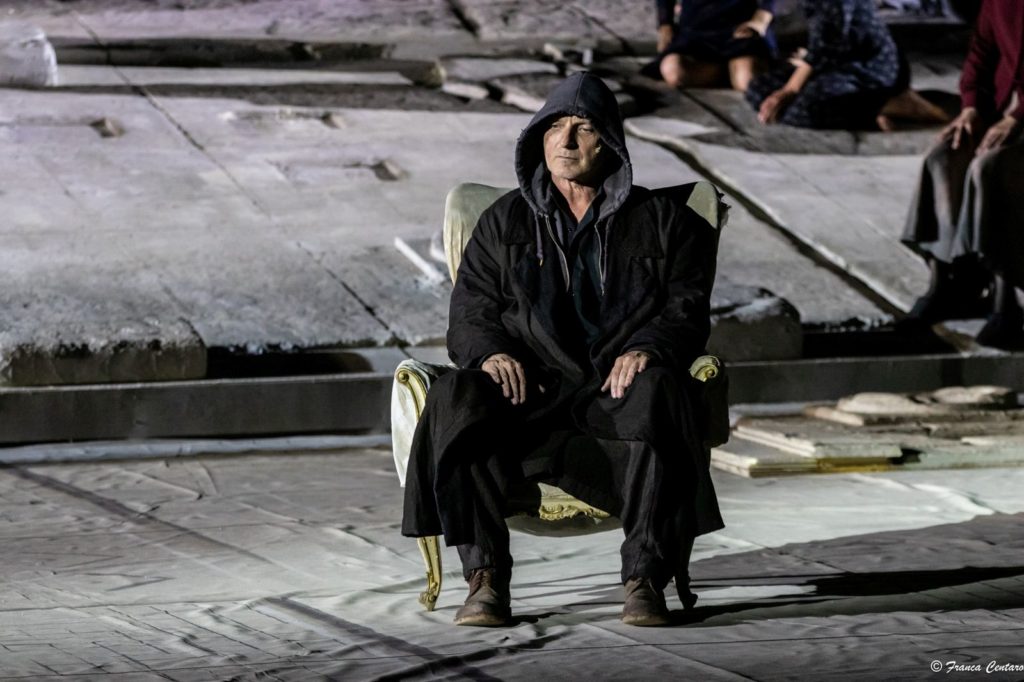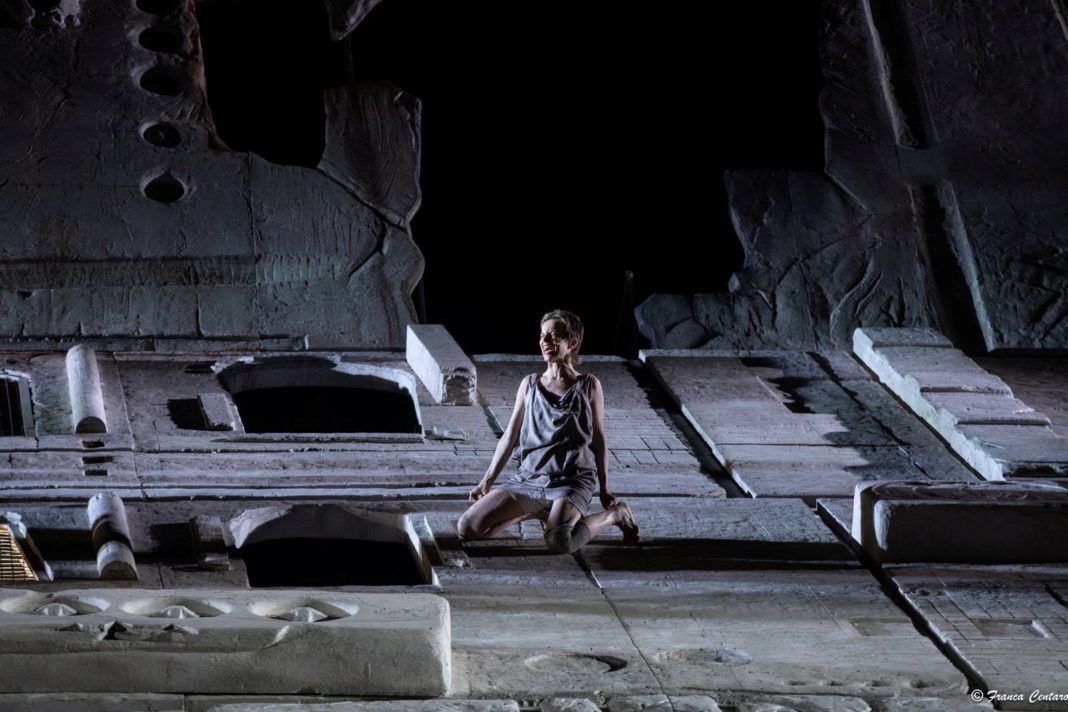La rabbia di una donna. La sua solitudine, il grido di una prigioniera, vestita di stracci: aspetta che il fratello Oreste la liberi dai nemici, killer dell’amato padre, Agamennone, re di Micene e comandante supremo degli Achei nella guerra di Troia.
Elettra attraversa il suo dolore fino in fondo così come glielo ha cucito addosso Sofocle nell’antica tragedia a lei dedicata, e lo fa arrivare, potentissimo, dopo le rappresentazioni del maggio scorso a Siracusa, al pubblico che affolla il teatro grande di Pompei nella rassegna organizzata di sera nel suggestivo parco archeologico.
Quella che colpisce, ancora prima che l’azione prenda forma grazie a voci e corpi dei personaggi, è la scena (di Gianni Carluccio): una natura morta, spiega il regista Roberto Andò, direttore artistico del teatro nazionale di Napoli. Ovvero il palazzo di Micene così come lo percepisce Elettra, che subisce il controllo dei suoi carcerieri, sua madre Clitennestra e l’usurpatore Egisto, autoproclamatosi sovrano.
Un piano inclinato, la reggia, forata da occhiaie, grandi tondi che fungono da finestre da dove entrano e escono le tragiche figure. In primo piano, alla sinistra di chi osserva, un pianoforte contaminato dalla polvere della memoria.
Ed è la musica che dà il colpo d’inizio. Sonia Bergamasco sfiora la tastiera e s’incammina nel suo itinerario di sofferenza da protagonista: è un’Elettra impetuosa, carica di ira ma anche di speranza che il fratello Oreste, da lei affidato a un focese per salvarlo dagli intrighi dei due assassini, torni sul luogo del delitto per compiere la giusta vendetta. Elettra sfoga il suo risentimento quando Egisto non è a Palazzo.
Declina con veemenza le vessazioni subite in questi lunghi dieci anni di attesa, affiancata da un coro consolatorio al femminile, interpretato da Clara Borghesi, Carlotta Ceci, Ludovica Garofani, Gemma Lapi, Zoe Laudani, Arianna Martinelli, Francesca Sparacino, Francesca Totti, Siria Veronese Sandre. E il dramma diventa collettivo, interrotto dalla più cauta Crisotemi (una convincente Silvia Ajelli), sorella di Elettra che invita alla prudenza anche dei sentimenti.

Un scossa elettrica sulla pelle di spettatrici e spettatori giunge ancora da Clitennestra che si mostra con l’energica e ferma voce di Anna Bonaiuto, ribadendo come fosse necessario uccidere il marito macchiatosi del sangue della loro figlia, Ifigenia, per placare l’ira dei dei.
A sparigliare le carte, un inganno: l’arrivo degli stranieri che diffondono una falsa notizia. Oreste è morto in un incidente e per provarlo viene mostrata a Elettra un’urna che ne contiene le ceneri. Lei si dispera e decide di compiere da sola l’atto di giustizia finale.
Le emozioni dilagano sul palco: Oreste (un toccante Roberto Latini), commosso dall’affetto della sorella, si rivela. E la tragedia si compie. Prima tocca a Clitennestra di essere massacrata e poi a Egisto (un incisivo Roberto Trifirò, pur nella brevità della irruzione).
Dall’alba all’imbrunire, l’altalena delle inquietudini si placa: le dita di Elettra scivolano velocissime sui tasti del piano su cui finisce per stendersi. Come una bambina che sta per nascere dal grembo materno.
Seme di passioni eterne che dall’antica Grecia continuano a fiorire nella bellezza del teatro.
©Riproduzione riservata
Per saperne di più
Learn more
https://www.teatrodinapoli.it/pompei/
ULTIMO APPUNTAMENTO DELLA RASSEGNA
POMPEII THEATRUM MUNDI
18, 19 e 20 luglio 2025 Lisitrata di Aristofane,
regia Serena Sinigaglia

Electra, prisoner of rage and emotion. But her pain melts away amid the music
The rage of a woman. Her loneliness is like the cry of a prisoner: she is waiting for her brother, Orestes, to free her from her enemies — the killers of her beloved father, Agamemnon, the King of Mycenae and Supreme Commander of the Achaeans in the Trojan War.
Electra experiences her grief to the depths, just as Sophocles portrayed her in the ancient tragedy named after her. Following last May’s performances in Syracuse, she now reaches the audience at the grand theatre of Pompeii, at the evening event held in the evocative archaeological park.
Even before the action takes shape, the scene (by Gianni Carluccio) is striking: a still life, explains director Roberto Andò, artistic director of the Naples National Theatre. In other words, it is the palace of Mycenae as perceived by Electra, who is subject to the control of her captors: her mother, Clytemnestra, and the usurper, Aegisthus, the self-proclaimed ruler.
An inclined plane pierced by dark circles — large, round windows through which tragic figures enter and exit the palace. In the foreground, to the left of the viewer, is a piano covered by the dust of memory.
It is the music that sets the tempo. Sonia Bergamasco touches the musical instrument and embarks on her journey of suffering as the protagonist. She is an impetuous Electra, full of anger, but also of hope that her brother Orestes will return to the scene of the crime to carry out just revenge. She entrusted him to a Phocaean to save him from the intrigues of the two murderers. Electra expresses her resentment when Aegisthus is not at the palace.
Flanked by a consoling female chorus played by Clara Borghesi, Carlotta Ceci, Ludovica Garofani, Gemma Lapi, Zoe Laudani, Arianna Martinelli, Francesca Sparacino, Francesca Totti and Syria Veronese Sandre, she vehemently decries the harassment she has suffered during these long ten years of waiting. The drama becomes collective and is interrupted by the more cautious Crisotemi (convincingly played by Silvia Ajelli), Elettra’s sister, who advises caution even in matters of the feelings.
Spectators still feel an electric shock when Clytemnestra appears, her firm and energetic voice brought to life by Anna Bonaiuto. She reiterates that it was necessary to kill her husband, who was stained with the blood of their daughter Iphigenia, in order to appease the gods’ wrath.
A deception upsets the cards: the arrival of foreigners who spread fake news. Orestes has died in an accident, and Electra is shown an urn containing his ashes to prove it. She is devastated and decides to carry out the final act of justice by herself.
Emotions run high on stage: Moved by his sister’s affection, Orestes (played by the touching Roberto Latini) reveals himself. And the tragedy is fulfilled. First, Clytemnestra is slaughtered, and then Aegisthus (an incisive Roberto Trifirò) meets the same fate.
From dawn to dusk, the seesaw of anxieties subsides. Electra’s fingers glide swiftly over the piano keys, on which she eventually lies. She lies there like a child about to be born from her mother’s womb.
These are the seeds of eternal passions that, from ancient Greece, continue to bloom in the beauty of theatre.










